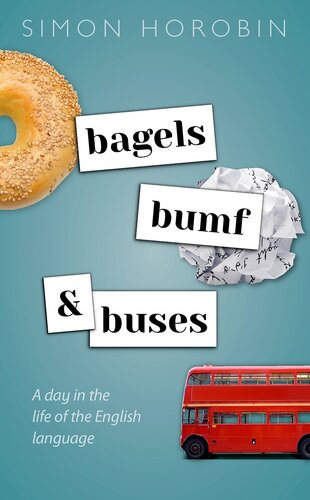
Bagels, Bumf, and Buses
A Day in the Life of the English Language
کتاب های مرتبط
- اطلاعات
- نقد و بررسی
- دیدگاه کاربران
نقد و بررسی

October 28, 2019
Horobin (How English Became English), an Oxford professor of English language and literature, dives into word origins in this enjoyable, fast-paced survey. He structures his book according to aspects of everyday life, offering up a litany of words related to each topic. In a section on eating, Horobin traces the ancestry of the word pudding back to the Anglo-Norman bodeyn, meaning “sausage” (because puddings were once cooked in sausage-like casings), itself deriving from the Latin botellus, meaning “small intestine.” (And upon discovering this, he observes, “you may find yourself suddenly feeling unexpectedly full.”) Regarding money, he shows how words in use today preserve traces of past cultures’ physical artifacts: coin derives from the Latin cuneus, or “wedge,” referring to the Romans’ wedge-shaped coin stamper, while the Greek word for the equivalent device, kharakter, gives English character, meaning a person’s mark or trait. In addition to ancient history, Horobin delves into the modern language of social media and illustrates its deficiencies by explaining how Moby-Dick’s famous opening sentence was rendered in the adaptation Emoji Dick: as a string of symbols representing a telephone, a man with a mustache, a boat, a whale, and an “okay” hand signal. Horobin’s often humorous and always enthusiastic work will entertain readers by revealing the dynamic nature of language.

October 1, 2019
Horobin (English, Oxford Univ.) has written a short guide to the etymology of some commonly used English words. In tracing the origin of everyday language--terms used to describe everything from the moment we wake in the morning (the origin of alarm comes from the Italian all'arme "to arms") to evening activities and pastimes such as the theater, chess or musicals, we learn that familiar expressions have myriad linguistic sources. Using a "day in our lives" as an organizing principle, Horobin shows how words associated with breakfast, getting dressed, going to work, meals, and sports and leisure activities have various and disparate linguistic origins. VERDICT For anyone curious about where everyday English words "come from," this accessible text will prove to be an enticing choice, as well as a useful guide for general readers seeking resources on English usage and popular linguistics.--Herbert E. Shapiro, Boca Raton, FL
Copyright 2019 Library Journal, LLC Used with permission.

December 15, 2019
The English language's flexibility in borrowing words from every possible source keeps the language joyously alive and constantly evolving. British language expert Horobin turns his attention to the origin of everyday words, not simply technical or abstruse lexicals. Starting at daybreak, he parses the meaning of alarm, which jars us awake with buzzes or bells, but which arises from the much more portentous Italian all'arme, literally a provocation to grab one's gun. Horobin moves on to the origins of words used in work and play: health, politics, religion, sports (including the origin of crossword ), parenting, and more. Not only our daily meals' multiple ethnic origins, but also the way we name their components comes under scrutiny. Horobin even plumbs the depths of emoticons and emojis, the latest offspring of linguistic evolution. Horobin has a gentle bias to British English, hence the appearance of bumf (pointless paperwork) in the title, a word not much used this side of the Atlantic. Fans of language and of pursuing trivia will find a goldmine of the unusual, surprising, and always fascinating history of everyday words.(Reprinted with permission of Booklist, copyright 2019, American Library Association.)

























دیدگاه کاربران